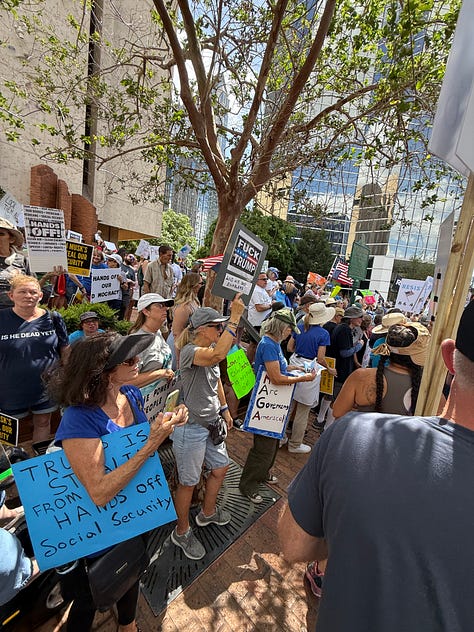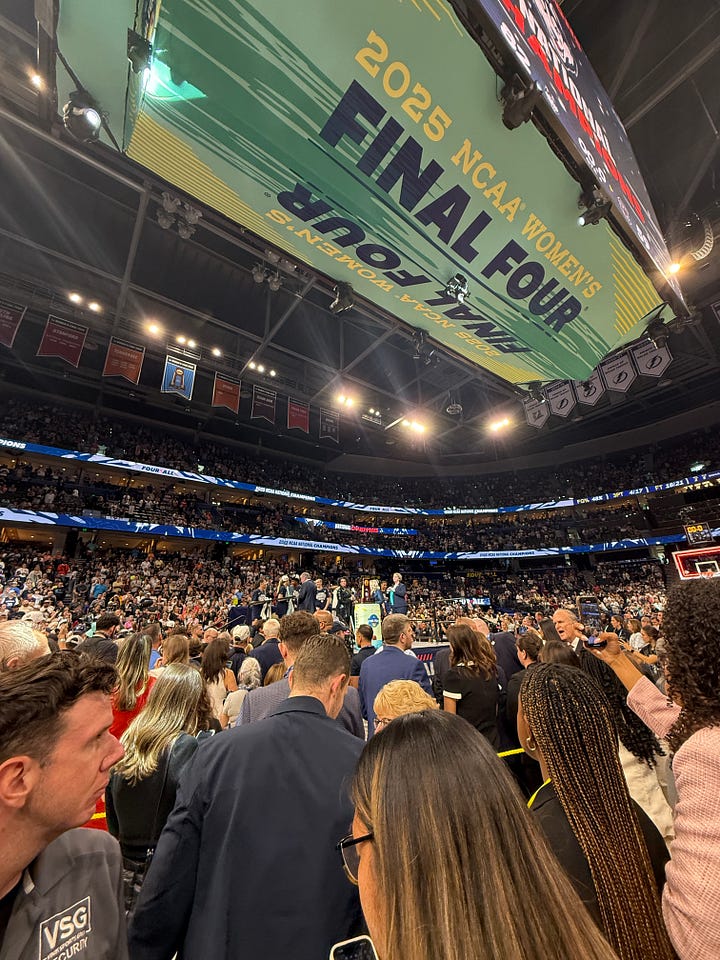Learning, growing, and grasping for meaning in Tampa
My personal reflections from a month of madness.
Hi, friends. From the ACC tournament to the first two rounds of the NCAA tournament to the Final Four in Tampa last weekend — where I watched the University of Connecticut absolutely destroy South Carolina 82-59 to win the record-setting 12th national championship in the storied program’s history — I’ve watched 22 women’s college basketball from press seats in a little over a one-month span.
It was invigorating. It was inspiring. And it was also incredibly exhausting.
To be candid, I felt a disconnect with the tournament this year, despite my physical proximity. I’m sure part of that was because, let’s face it, this wasn’t the most compelling tournament in recent years. But there were other factors, too. More than five years into Power Plays, I still haven’t quite gotten the hang of what in-person coverage should look like for me; I often get overwhelmed by the self-inflicted pressure to make a trip “worth it.”
Then, there’s, well, everything else going on in the world right now.
In the middle of my personal March Madness tour, I traveled to Ohio to reunite with my Burn It All Down co-hosts and record a live podcast as the keynote for the Social Justice through Sport and Exercise Psychology Symposium at Bowling Green University. That show will be released to the public soon, but to go ahead and spoil it for you, we dove into the cognitive dissonance needed to enjoy this boom in women’s sports while the world is falling apart; the dangerous ways transphobia is weaponized in the name of women’s sports; and the fact that history teaches us that every time there is a surge in popularity in women’s sports, a political backlash soon follows. (It was fun! I promise!)
All of those topics were top of mind headed into the Final Four. Wrestling with such complicated issues can be all-consuming, and make everything else — even one of the biggest and most popular women’s sporting events in the world — feel pointless. So last Saturday, after media availability on the eve of the national championship game, I stopped by Tampa’s Hands Off protest, which was just about a 10-minute walk from Amalie Arena, in search of some way to rectify it all, to find meaning in the madness.
Unfortunately, it made me feel more uneasy than ever.



Don’t get me wrong — there was a great turnout, and it was heartening to see so many citizens take to the streets, especially in such a red state. But I think I was looking for signs that the protest was in community with the Final Four; instead, besides the actual Final Four signs that were hanging on the light poles, there wasn’t a hint that the events existed in the same universe. During the previous Trump administration, I’d often see women’s sports merchandise front and center at protests. Now, everything feels so siloed. It’s unsettling.
Even on Sunday, I couldn’t shake this feeling of discord. Yes, It was incredible to be in a sold-out arena and watch Paige Bueckers get her fairytale ending, to see Geno Auriemma back on top, to see Sarah Strong emerge as a superstar. Yes, it was a gift to sit in a press conference while Dawn Staley processed a big win and a tough loss in real time, Cori Close reflected on women’s basketball history, and Vic Schaefer teared up while talking about his seniors; these are moments that I will never, ever take for granted.


But, when I think back to this month of basketball, my time in Tampa isn’t what resonates the most.
Instead, what stands out is a very sparsely-attended press conference in Chapel Hill, North Carolina, after the First Four game between the Washington Huskies and Columbia Lions, before the first round of the NCAA tournament even began. I stopped by Carmichael Arena to watch the game after a long day of media availability at Duke, and almost left the game at halftime, with the Lions trailing by 13 points. I was glad I stayed, because I got to see the Lions pull off a thrilling comeback to get their first NCAA tournament win in school history, 63-60. But after sitting through a joyous Columbia press conference, I almost left again, because it had been a very long day and was the start of a very long weekend. At the last second, I chose to stick around for Washington’s presser, because I’d aways admired Tina Langley from afar but never had a chance to speak with her.
Langley was joined at the podium by sophomore guard Sayvia Sellers and senior forward Dalayah Daniels. All three were clearly emotional, which isn’t unusual after a season-ending loss. After answering questions about the game itself, a local reporter asked the players about their big-picture takeaways from the season.
“[T]hese are my sisters for life. We talk so much about the journey and not just like focusing on results because, at the end of the day, like a trophy is a materialistic thing, like it's a thing. It's just going to fade. But these relationships are going to last forever,” Daniels said.
“I've learned so many valuable things in my life. Coach Langley is an amazing woman. She doesn't just teach us how to be amazing basketball players, but she wants to teach us how to run our own house one day and how to be a CEO, how to be a boss, and that's everything that she is. I think just being able to follow her these past three years, like she changed my life.”
I watched Langley’s face as Daniels spoke, and it was clear the words made her emotional. (I mean, how could they not?) So when it was time for questions for the coach, I asked her about it. (Emphasis mine.)
Q. Coach, hearing your players talk about you, what you've meant to them, what does that mean to you? And as a coach, so often you are judged on your wins and your losses, but it's obviously about much more than that.
TINA LANGLEY: It's hard to sit here with them because the loss is mine. This game, it's on me, but I'm so proud of them. To sit here and listen to them, to hear how they've grown, how much they love each other, how much they love being here, how much they love caring for one another.
We learn from each other. They don't just learn from me. So I thought they did a beautiful job of saying who we are and who we hope to be, the way that we're committed to one another. So it was beautiful to sit here and listen and learn from them.
I think that's what our culture is, it's becoming. We tell them all the time, they're not the only ones becoming. We're all growing. We're all trying to be better. And they did a tremendous job this year helping this program grow. In the process they grew and we grew.
I love that they talked about our staff. They did a phenomenal job this year. But genuinely I appreciate that question a lot because there's nothing more important than the impact we make on each other and people in life.
I think Dalayah said it well. You could ask me about a lot of my basketball games. I can't tell you a lot about them, but I can tell you about the people. That's what we want to do. We want to be great for people and help each other be better.
I’ve cued up her response in the video below, and I think it’s worth a watch.
It’s easy to get swept up in the grandeur of the women’s Final Four, the rising ratings (8.5 million viewers for the championship game!), and the dynasties at the top of the sport. To celebrate Azzi Fudd, debate Sania Feagin’s draft stock, and immediately turn our attentions over to the tantalizing action in the transfer portal. And all of those things deserve all of the attention in the word. They matter. A lot!
But I think some of my disconnect the past few weeks came from my desire to connect the big-picture stories I focus on in Power Plays with the biggest moments in women’s sports, like the Final Four and championship games. But those are the highlights of the sport, not the heart of it.
I showed up to March Madness reeling from the political reality we’re living in, and searching for the point of it all. But I think showing up is, in itself, the point. Show up to community protests and First Four games; show up to voting booths and high-school girls’ volleyball games; show up to watch parties and championship parades. Show up even when — no, especially when — you feel detached and dispirited. Show up to, as Langley said, be great for people and help each other be better.
It’s certainly not the main takeaway I expected to have after this college basketball postseason. But I guess that’s why they play — and reporters go in-person to cover cover — the games.




What a great question and response. That’s what collegiate athletics is all about. Hopefully player empowerment and mobility leads to more coaches like her and Dawn Staley. How could it not?
I was just thinking how I miss BIAD. Really excited to listen to that reunion episode.